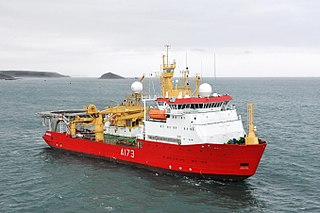
HMS Endurance was an icebreaker that served as the Royal Navy ice patrol ship between 1991 and 2008. Built in Norway as MV Polar Circle, she was chartered by the Royal Navy in 1991 as HMS Polar Circle, before being purchased outright and renamed HMS Endurance in 1992 as a replacement for the previous HMS Endurance whose hull had been weakened by striking an iceberg.

The Hecla class formed the backbone of the Royal Navy's ocean survey fleet from the mid-1960s.

HMS Scott is an ocean survey vessel of the Royal Navy, and the only vessel of her class. She is the third Royal Navy ship to carry the name, and the second to be named after the Antarctic explorer, Robert Falcon Scott. She was ordered to replace the survey ship HMS Hecla.

HMS Hecla was the lead ship of the Hecla class, an oceangoing survey ship type in the Royal Navy. She was ordered in the mid-1960s, along with her sister ships HMS Hecate and HMS Hydra. A fourth ship, HMS Herald, was completed in the early 1970s. The ship served for thirty years in this role, and various others, before finally being replaced by HMS Scott in 1997. Hecla was sold to private interests, being renamed "Bligh" after Vice-Admiral William Bligh. After this, the vessel was used in a hydrographic survey of Irish waters, and was based in Waterford, Ireland.
HMS Hecate (A137) was a Royal Navy deep ocean survey vessel of the Hecla class. She was present at the "presentation of fleet colours" review in Torbay on 29 July 1969. The ship was decommissioned in 1990.

HMS Herald was a Hecla-class ocean survey ship that served with the Royal Navy during both the Falklands War and Gulf War.

Admiralty charts are nautical charts issued by the United Kingdom Hydrographic Office (UKHO) and subject to Crown Copyright. Over 3,500 Standard Nautical Charts (SNCs) and 14,000 Electronic Navigational Charts (ENCs) are available with the Admiralty portfolio offering the widest official coverage of international shipping routes and ports, in varying detail.
Seven ships of the British Royal Navy have been called HMS Protector:

The harbour defence motor launch (HDML) was a 72 ft (22 m) long British-designed motor vessel used for harbour defence during World War II. Nearly 500 were built by numerous Allied countries during the war.

Henry Robb, Limited, known colloquially as Robbs, was a Scottish shipbuilding company based at Leith Docks in Edinburgh. Robbs was notable for building small-to-medium sized vessels, particularly tugs and dredgers.

HMS Scott (J79) was a Halcyon-class minesweeper of the British Royal Navy completed as an unarmed survey ship with an enlarged bridge and a large chart room abaft the extended forecastle deck. She served through World War II and the two following decades.
Rear-Admiral Sir David William Haslam was a Royal Navy officer.

HMS Myrmidon was a Cormorant-class gunvessel of the Royal Navy, built at Chatham Dockyard and launched in 1867. She served on the North America and West Indies Station and surveyed parts of the Australian coast before being sold at Hong Kong in 1889.

HMS Protector is a Royal Navy ice patrol ship built in Norway in mid 2000. As MV Polarbjørn she operated under charter as a polar research icebreaker and a subsea support vessel. In 2011, she was chartered as a temporary replacement for the ice patrol ship HMS Endurance and was purchased by the British Ministry of Defence in early September 2013. As DNV Ice Class 05 the vessel can handle first year ice up to 0.5 metres (20 in).

A repair ship is a naval auxiliary ship designed to provide maintenance support to warships. Repair ships provide similar services to destroyer, submarine and seaplane tenders or depot ships, but may offer a broader range of repair capability including equipment and personnel for repair of more significant machinery failures or battle damage.

Vice-Admiral Sir John Augustine Edgell, KBE, CB, FRS was an officer in the Royal Navy and Hydrographer of the Navy from 1932 to 1945. He was noted for his support for innovations such as echo sounding and radio navigation, for the surveying and chart production operations of his department during World War II, and for his advocacy of the science of oceanography

HMS Medusa (A353) is a harbour defence motor launch of the Royal Navy that saw service in World War II, constructed by Newman, R A & Sons Ltd, Poole in 1943.














